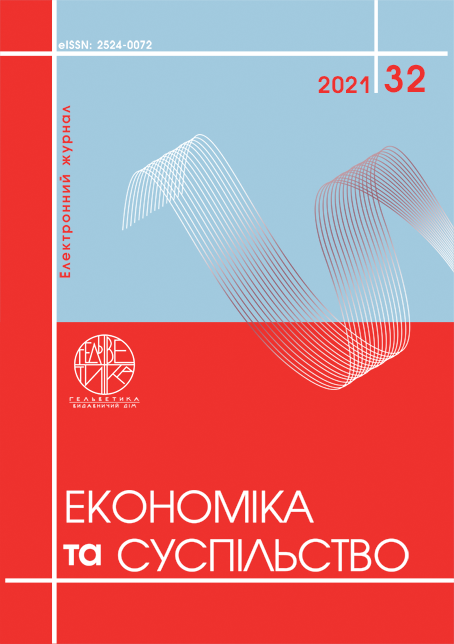USE OF MODERN TECHNOLOGIES TO MANAGE PROJECTS AND THEIR RESOURCES IN TIME OF CRISIS
Abstract
The work is devoted to the consideration of project management processes. Particular attention is paid to anti-crisis mechanisms of business process adaptation and risk management techniques. Theoretical aspects are identified in order to identify the causes of risks that arise in project management, and classify their conditions, according to the stage of the project life cycle. The subject of the study is the analysis of fundamental methods of project management. The classification features of the project management phenomenon are analysed. The article also defines the essence and content of the project management phases and their interpretation. The analysis was based on modern world experience of the research topic, without concretization. As a result of incessant globalization processes, the complexity of the nature of crisis phenomena and the frequency of their occurrence are constantly growing, so it is extremely important to influence their impact. It is in a crisis of uncertainty that it is necessary to resort to a combination of management and marketing tools in a complex to meet the requirements of the project. There are many projectors with a huge strategy of tools in the relevant special arsenals of specialists, but their selection is extremely high for the rational use or conservation of available resources. The problem area of most enterprises is the inefficient use of project resources, as the budget, which is allocated in advance for development and research, is primarily subject to reduction in crisis situations. This decision of most companies is wrong and leads to their collapse or complete elimination due to lack of resources. Therefore, the search for optimal strategic decisions in the enterprise through the use of project management is key and requires research of all available information and other resources of the enterprise. For this purpose, the resource provision of the enterprise requires constant high-quality continuous modernization and the use of strategic planning and forecasting to find solutions in times of crisis. The paper comprehensively considers the main elements of project management, through which you can comprehensively manage risks in the integration of individual projects.
References
Бушуєв С. Д. Словник-довідник з питань управління проектами; ред. Київ : Видавничий дім «Деловая Украина», 2001. 640 с.
Грей К. Ф., Ларсон Э. У. Управление проектами: Учебник / Пер. с англ. пятого, полностью перераб. изд. Москва : Дело и сервис, 2013.
Дункан В. Р. Керівництво з основ проектного менеджменту; Інститут проектного менеджменту США (РМІ), Комітет з питань стандартів РМІ. Київ : Віпол, 1999. 197 с.
Кунденко А. В., Смущенко І. А., Овсянюк К. О. Причини та наслідки криз вітчизняних підприємств. Науковий вісник ЧДІЕУ. Серія 1 Економіка. 2013. № 1 (17). С. 118–125.
Петровська Т. Е. Життєвий цикл проекту та його удосконалення під час впровадження проекту. Збірник наукових праць Української державної академії залізничного транспорту. 2013. Вип. 139. С. 293–298.
Сахно Є. Ю., Богдан М. В., Ребенок А. В. Застосування концептуальних систем управління проектами розвитку організації. Актуальні проблеми економіки. 2004. № 8. С. 170–175.
Bushuyev S. D. (2001) Slovnyk-dovidnyk z pytan upravlinnia proektamy [Dictionary-guide to project management]. Kyiv: Vydavnychyi dim "Delovaia Ukrayna.
Gray K. F., Larson E. U. (2013) Upravlenye proektamy [Project Management: Textbook]. Moskva: Delo i servis.
Duncan V. R. (1999) Kerivnytstvo z osnov proektnoho menedzhmentu; Instytut proektnoho menedzhmentu SShA (RMI), Komitet z pytan standartiv RMI [Guide to the basics of project management; US Project Management Institute (RMI), RMI Standards Committe]. Kyiv: Vipol.
Kundenko, A. V., Smushchenko I. A., Ovsyanyuk K. O. (2013) Causes and consequences of crises of domestic enterprises. Scientific Bulletin of ChDIEU. Series 1 Economics, 1 (17), 118–125.
Petrovska T. E. (2013) Zhyttievyi tsykl proektu ta yoho udoskonalennia pid chas vprovadzhennia proektu [Project life cycle and its improvement during project implementation]. Collection of scientific works of the Ukrainian State Academy of Railway Transport, 139, 293–298.
Sakhno E. Y., Bogdan M. V., Rebenok A. V. (2004) Zastosuvannia kontseptualnykh system upravlinnia proektamy rozvytku orhanizatsii [Application of conceptual project management systems for organizational development]. Current economic problems, 8, 170–175.


